
LAST August we published a piece looking at attempts by a section of the commercial fishing industry to obtain Marine Stewardship Council (MSC) certification for the orange roughy fishery off eastern Tasmania. If the MSC certifies a fishery as “sustainable”, major retail players who are now attuned to environmental sensitivities in their customer bases are more likely to stock the product, so there’s a lot to play for. We noted that both the World Wildlife Fund (WWF) and the Australian Marine Conservation Society (AMCS) were opposed to the certification and then opened up the issue for reader comments.
The website received 24 “comments”, some of which addressed the orange roughy question directly and others which turned into a debate on a wider range of Commonwealth and state fisheries management issues. Well, the WWF and the AMCS did subsequently object formally to the fishery being certified. In January, the independent adjudicator (an independent legal expert appointed to hear the objection) ruled in their favour. The review process then allowed for modification of the original bid for certification and resubmission by the proponents. In April, the adjudicator rejected the revised bid for a second time.
This is only the third objection to be upheld from 46 objections lodged by non-government organisations to individual fishery certifications since MSC certification was established. The WWF/AMCS case paired the impact of trawling on ancient deep-sea corals in the area fished with an argument that no fish listed as an endangered, threatened and protected (ETP) species under Australian law should be “eligible” for certification as sustainable under the MSC standard. The adjudicator appears to have agreed, twice.
Commonwealth environmental legislation lists the orange roughy as “conservation dependent”, but as we noted in the August article this level of protection does not prevent targeted fishing for the species. The fish remains on many international seafood “avoid” lists due to historical overfishing and population depletion. What effect the decision to block MSC certification for the Tasmanian fishery has on the local industry, and whether or not it will have another go at certification in the future, is unclear at the time of writing. Equally interesting to observe will be the knock-on effects of the decision should other fisheries targeting species under some form of legislative “protection” seek MSC certification, both in Australia and internationally. The WWF must feel particularly emboldened.
Be interesting to see where the orange roughy certification issue goes from here, if anywhere…
















